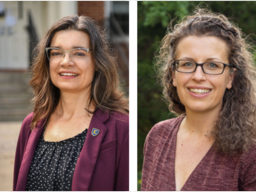Designing digital data collection & transcription workflow:
working with social media and Otter.ai
Location
Online
Designing digital data collection & transcription workflow: – Online Event
Date & Time
September 27, 2023, 11:30 am – 1:00 pm
Description
Designing digital data collection and transcription workflows: Working with social media and Otter.ai
Presented by Trena M. Paulus, Ph.D. and Jessica Nina Lester, Ph.D.
Now more than ever, technological innovations are shaping qualitative research methods and methodologies in complex ways. In this workshop, the presenters will offer participants theoretical grounding and practical guidance for developing two personalized digital qualitative research workflows.
During this 90-minute session, participants will be guided in:
- Applying a reflexivity framework to consider potential consequences of using digital tools and spaces in qualitative research designs
- Considering social media as a potentially ethical and robust source of qualitative data
- Creating an efficient and effective transcription workflow that draws upon the features of Otter.ai
By the end of the session, participants will have generated their own digital workflows for qualitative research designs and considered key reflexivity questions to guide future methodological decisions.
Trena M. Paulus, Ph.D., is a professor in the department of sociology and anthropology at East Tennessee State University. She served as a 2023 Fulbright Distinguished Scholar in Humanities and the Social Sciences at Adam Mickiewicz University in Poland. She is the co-author of three books, including Doing Qualitative Research in a Digital world, published by Sage in 2022, Looking for Insight, Transformation and Learning in Online Talk published by Routledge in 2019, and Digital Tools for Qualitative Research, also published by Sage in 2014. She has published over 80 peer-reviewed journal articles and co-edited four special journal issues. Professor Paulus and her co-authors won the 2018 Neal R. Norrick Special Issue award for The Microanalysis of Online Data in the Journal of Pragmatics and the Distance Education Best Practice Award from the Association of Educational Communication & Technology in 2017. She has facilitated numerous workshops in national and international contexts, including as a visiting scholar at the University of Tasmania in 2014. Professor Paulus specializes in the areas of qualitative research technologies, including the development of innovative methodologies for analyzing social media and online learning environments. Professor Paulus is a certified professional trainer for ATLAS.ti qualitative data analysis software.
Jessica Nina Lester, Ph.D., is a professor of Qualitative Methodology in the School of Education at Indiana University, Bloomington. Having been trained in cultural studies and qualitative research methodology, she takes an interdisciplinary approach to her scholarship, including both the methodological and substantive foci of her research program. In her methodological work, Lester focuses on the study of language-based methods, digital tools in qualitative research, and disability in qualitative inquiry. Her substantive research has focused on examining interactional practices in clinical and educational contexts that involve children and youth. She is the co-author of 7 books and co-editor of 8 volumes. In addition, she has published over 90 peer-reviewed journal articles and co-edited 14 special journal issues. Lester has received numerous awards for her scholarship, among them the 2018 APA Distinguished Early Career Contributions in Qualitative Inquiry Award and the 2022 American Educational Studies Association Critics’ Choice Book Award. At Indiana University, Lester teaches qualitative methods courses and was recently recognized by the 2022 Gorman Distinguished Teaching Award.
Organized by the Center for Social Science Scholarship and cosponsored by the Dresher Center for the Humanities.
